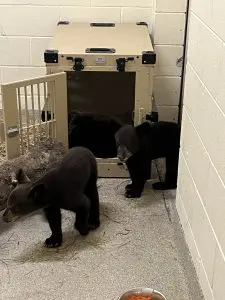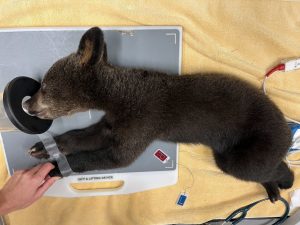

Fern and Branch explored their quarantined area before they moved to our Black Bear Rehabilitation Center.
The more bears, the merrier! We are now caring for five Florida black bear cubs at our Black Bear Rehabilitation Center, affectionately known as Brody Bear’s Rescue and Rehab.
Recently, we shared that we added three bear cubs to our Center: Rickie, Morty and Frosty. Now, two new playmates have been introduced to the trio: a female cub named Fern and her brother, Branch!
Florida Fish and Wildlife Conservation Commission (FWC) found these two cubs wandering together near the Florida Panhandle. Sadly, their mother was struck by a car and passed away, leaving the approximately four-month-old cubs stranded on their own.
When FWC brought Fern and Branch to our Zoo, our staff performed an intake exam on the cubs. Luckily, the siblings are healthy and free of injury. Once they were cleared by our veterinary staff, the duo was ready to join our other three cubs.

Fern during her intake exam
With five bear cubs scurrying around the habitat, there’s never a dull moment in our Rehabilitation Center! Morty, the most rambunctious cub of the bunch, has become best buds with Branch. The two spend hours playing and chasing one another.
As we shared in a past blog, giving cubs ways to teach themselves natural bear behaviors is one of the best ways we can prepare our bear cub patients for their eventual release back to their natural habitats.
To accomplish this, Bear and Wellbeing Coordinator Marc Franzen and Director of Animal Programs Lauren Hinson brainstorm new enrichment opportunities for our bear patients, from introducing new scents like oranges to burying sugarcane for the little ones to forage.
As the cubs learn from their experiences, we learn from them! Carefully watching the cubs’ reactions through our cameras across the habitat, Marc takes note of which enrichment opportunities bring out important behaviors like scent investigation, play and problem solving. Not only do these experiences keep the cubs entertained and curious, but practicing these behaviors essentially teaches them “how to be a bear” in the absence of their mothers.
Stay tuned to our blog and social media for updates on these five cubs, as well as any newcomers that join our Rehabilitation Center in the future!
Contact FWC’s Wildlife Alert Hotline at 888-404-FWCC (3922) if you have found a sick, orphaned, injured or dead Florida black bear. To leave feedback on FWC’s Bear Management Plan, reach out to the Bear Management team at BearManagementatMyFWC.com. The FWC commissioners can be contacted here.